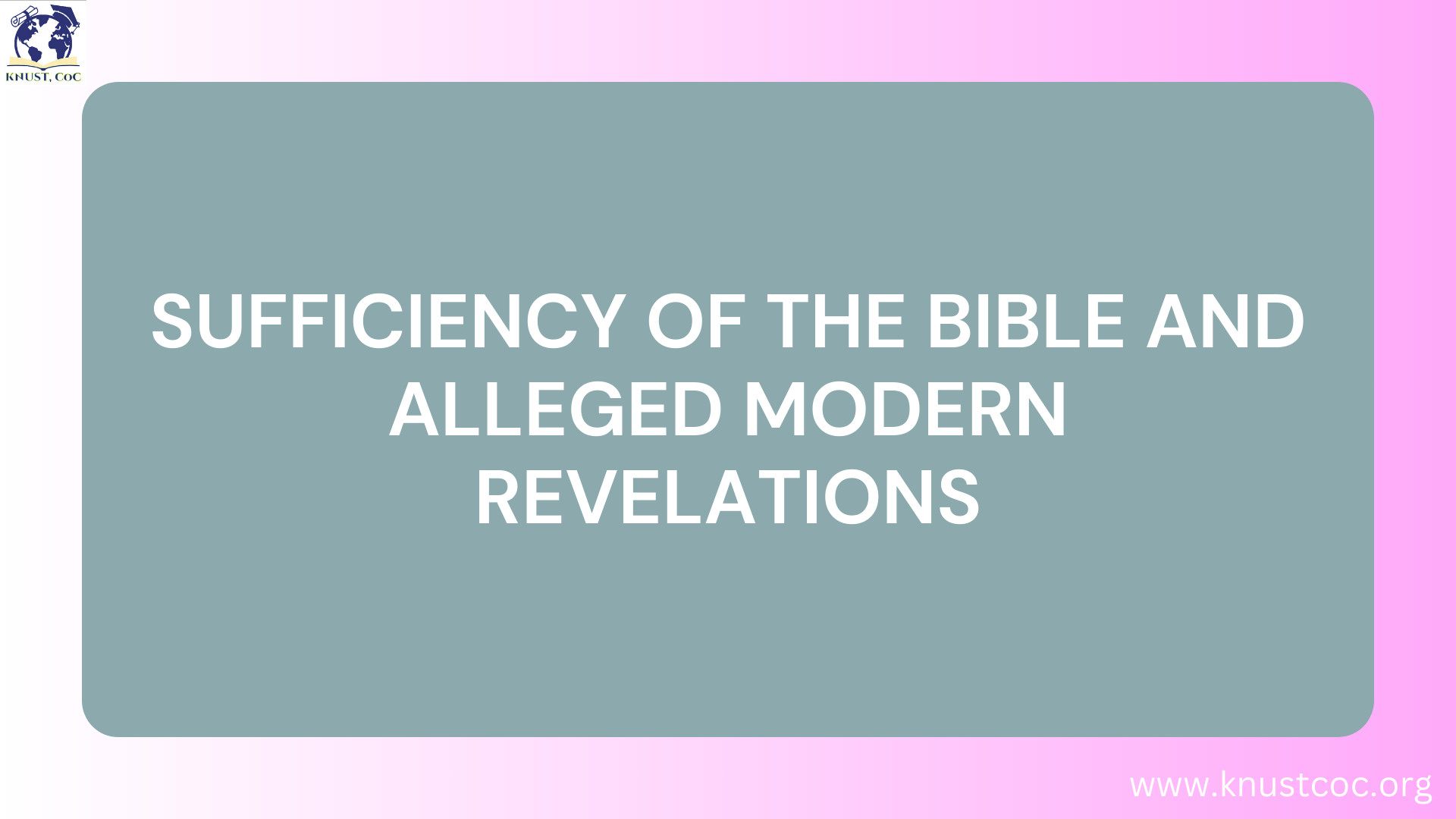![ASCERTAINING BIBLE AUTHORITY [Part 1]](https://knustcoc.org/wp-content/uploads/2024/03/5.jpg)
ASCERTAINING BIBLE AUTHORITY [Part 1]
By what authority do we do what we do in religion and who gave that authority are valid questions to ask. At one point in time, Jesus was asked these questions because He taught as one having authority (Matthew 7:29). Let us consider the following passage,
“Now when he came into the temple, the chief priests and the elders of the people confronted Him as He was teaching, and said, “By what authority are You doing these things? And who gave You this authority? But Jesus answered and said to them, “I also will ask you one thing, which if you tell Me, I likewise will tell you by what authority I do these things: “The baptism of John – where was it from? From heaven or from men?” And they reasoned among themselves, saying, “If we say, ‘From heaven,’ He will say to us, ‘Why then did you not believe him?’” (Matthew 21:23-25, NKJV)
In Jesus’ reply lies the two sources of authority in religion; Authority from heaven and Authority from man! If ones source of authority for what he/she practices in religion is not from heaven then it is from men and if what he/she practices is from men then it is not from heaven.
What Then Is Authority?
The concept of authority is illustrated in Matthew 8:9. The centurion as a man with authority gives command to soldiers under him and they submit to him. To one he says “Go,’ and he goes; and to another, ‘Come,’ and he comes; and to [his] servant, ‘Do this,’ and he does it.” Authority is therefore the power to control and the standard to which men must submit to. Paul wrote to the Romans;
“Brethren, my heart’s desire and prayer to God for Israel is that they may be saved. For I bear them witness that they have the zeal for God, but not according to knowledge. For they being ignorant of God’s righteousness, and seeking to establish their own righteousness, have not submitted to the righteousness of God.” (Romans 10:1-3, NKJV)
The Jews having not submitted to the knowledge of God had not submitted to God’s authority so they had established their own authority other than that of God hence they were not right with God! No matter how zealous one may be or the amount of worship one gives to God, if it is not in accordance with His commands or authority, it is vain (Matthew 15:9, 7:20-23) God being the source of all authority gave all to Christ (Matthew 28:18). Christ commanded His apostles to teach His commands for He possesses all authority (Matthew 28:19, 20). The apostles taught (Acts 2:42, 2 Thessalonians 2:15) not their own doctrines but that of Christ (1 Corinthians 14:37). They were simply the ambassadors of Christ (2 Corinthians 5:20). Note the following passages;
“And whatever you do in word or deed, do all in the name of the Lord Jesus, giving thanks to God the Father through Him.” (Colossians 3:17, NKJV). “And when they had set them in the midst, they asked, “By what power or by what name have you done this? … “let it be known to you all, and to all the people of Israel, that by the name of Jesus Christ of Nazareth, whom you crucified, whom God raised from the dead, by Him this man stands here before you whole.” (Acts 4:7, 10, NKJV)
Whatever man do must be done in the name of Jesus. “In the name of the Lord Jesus” simply suggest the authority of Jesus, it means invoking the authority of Christ. It means to act by or under the authority of Jesus with His approval. Whatever we do should therefore be subject to His authority. Whatever man has to know about the authority of Christ has been spelt out in the scriptures. 2 Timothy 3:16, 17 makes it clear. The authority has been given to us and we therefore have a task to ascertain it.
How God Does Not Authorize
God does not authorize on the basis of what pleases you (Jeremiah 10:23), self-imposed religion
(Colossians 2:22, 23), one’s zeal and sacrifice (1 Samuel 15:22, 23), one’s opinion (Isaiah 55:8,
9), commandments of men (Matthew 15:9), human traditions (Galatians 1:14), what highly
respected individual teaches (Galatians 1:6-9), inability to see harm (2 Samuel 6:6, 7), and
silence of the scriptures.
What about the Silence of Scriptures?
Many people in the Christendom contend that the silence of scriptures authorizes additions in worship. It is argued that instrumental music in worship is authorized by the silence of scriptures. If it is the case that things which the bible is silent about may be employed in worship, and if it is the case that the bible is silent about adding plantain chips to the Lord’s Supper: Then it is the case that adding plantain chips to the Lord’s Supper may be employed in worship! Certainly, this this is unwarranted in worship and therefore the major premise is false. The scripture explains the part that “silence” play in commands. Let us consider what the bible says about this matter; In Hebrews 1:5, the writer argues that Jesus is uniquely the Son of God by pointing out that God did not say to any of His angels “You are My Son” and thus, by the silence of God, the angels were excluded.
In Hebrews 7:13, 14, Jesus is a priest according to the order of Melchizedek and could not be a priest according to the order of Aaron. This is because Jesus was from the tribe of Judah not Levi. The writer argues that by virtue of the fact that God said that priest were to come from the tribe of Levi, priest according to the Levitical priesthood could not come from any other tribe! The command is therefore exclusive.
“Where a command is given and no other is given that adds to the idea, the silence of any other commands in the same area of thoughts makes the one command exclusive in nature.” (Paul Cantrell, 2001)
This principle is in Balaam’s statement in Numbers 22:18; “I could not go beyond the word of the LORD my God, to do less or more.” To act when the scripture is silent is to do more (see also 1 Corinthians 4:6, 1 Peter 4:11).
How God Does Authorize
One cannot be sure of anything he/she does in religion when he/she does not know how God
authorizes. God authorizes by direct statements, implications, examples and expediency.
Authority by Direct Statement
God expresses His will directly to us in many ways and our part is to obey or submit to them. By direct statements, God authorizes by direct mandate (Acts 2:38, 3:19, and 16:31), declarative statement (Mark 16:15-16), conditional statement (Colossians 3:1), prohibitory statement (Colossians 3:9), hortatory statement (Hebrews 6:1), optative statement (Romans 6:2, 2 Thessalonians 3:5), interrogative statement (Romans 6:1, 2, James 2:14-24). Note that some commands or direct statements do not apply to all people, it apply to certain individuals. Example; elders (Acts 20:28), husbands (Colossians 3:19), Wives (Colossians 3:18), and alien sinners (Acts 2:38). Some commands were binding at the time they were given but not now. Example; limited commission (Matthew 10:5-15), the desire for spiritual gifts (1 Corinthians 14:2) since they ceased in the first century.
Authority by Approved Example
Approved example is that example which is given as something the church was doing in obedience to God’s command. An approved example illustrates how to obey a given command and it is also approved by an inspired apostle hence binds. Consider the following; We have been commanded to observe the Lord’s Supper (1 Corinthians 11:24, 25) but when? If it is the case that we have an approved example for “when” it was observed, then we have the authority for the day to observe it. In Acts 20:7, it is the case that (1) the disciples with the apostle Paul waited to partake of the Lord’s Supper on the first day of the week (2) the purpose of the meeting was to observe the Lord’s Supper. We therefore have the authority for the day to observe the Lord’s Supper. Can we observe it on a Monday or on any other day? We do not have any authority for those days so we cannot observe it on any of those days. Note this;
“Whether an example is binding in the sense that it must be done, or in the
sense that it may be done has to be determined by due consideration of the
totality of the Bible teaching on that point at hand” (Roy Deaver, 1997)
Authority by Implication
The Bible teaches explicitly or implicitly and that which it teaches implicitly is as true and binding as that which it teaches explicitly. By implication, a necessary inference is drawn. When a command is neither expressly stated nor specifically exemplified, it may be determined by logical deduction. Inference is different from assumption.
In Acts 16:15, Lydia and her household were baptized. It is claimed that Lydia was married, had children and some were infants and since it is the case that her household were baptized, the infants were also baptized hence infant baptism endorsed! This is purely assumptions. Note this, For the argument to be true, (1) the definition of “household” must necessarily mean there is/are infant(s) in the house/family and if that is so, it must also imply that every inhabited house or family without infant(s) cannot be referred to as household! (2) The term “her household” can only be used if she was married and if that is so, it must be implied that the term cannot be used for Lydia even if she was staying with her family yet was unmarried! (3) All individuals in her family necessarily had to be baptized before the term “her household” can be used, this also implies that if everyone in her household got baptized except one, by virtue of the fact that one wasn’t baptized, the term household cannot be used! Since the arguments brought forth to authorize infant baptism from the passage are not facts, they are assumptions made to authorize where God has not authorized. For passages of this nature where enough background information was not given, one has to leave it as it is but ascertain the authority in light of clear passages.
By implication, if A=B and B=C, then A=C. This is the inescapable fact!
Christ authorized by implication in Matthew 22:29-32; in Christ making the argument that there is resurrection of the dead which the Sadducees did not believe in, He implied from the statement, “I am the God of Abraham, the God of Isaac and the God of Jacob” that God is not the God of the dead but of the living! Which implies that Abraham, Isaac and Jacob died but still live! If it was the case that Abraham, Isaac and Jacob died never to resurrect, then it should be the case that the statement should be “I was the God of Abraham, the God of Isaac and the God of Jacob.”
One is authorized to teach that Paul in becoming Christian repented of his sins however, there is no such statement yet we infer or imply from passages as follows: If it is the case that nobody can be a Christian without repenting of his sins; and Paul did become a Christian; it is the case that he repented of his sins. This fact is taught implicitly. For the Lord’s Supper, it has been established that they partook of it on Sunday so we have the authority for the day but what about the frequency? Implication is needed. It is the case that the purpose of the Sunday meeting was to observe the Lord’s Supper by the infinitive phrase of purpose “to break bread” (Acts 20:7) i.e. the disciples were brought together to break bread; it is the case that they met every first day of the week (1 Corinthians 16:2); and also continued steadfastly (constantly) in the observance of the Lord’s Supper (Acts 2:42): then the Lord’s Supper was observed every first day of the week hence implicitly we have authority for the observance on every Sunday. Can we observe it monthly or yearly? We have no authority for that.




